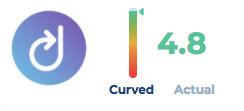dock.io is a decentralized data exchange protocol that lets people connect their profiles, reputations and experiences across the web with privacy and security.

see the full ratings here: https://cryptorated.com/ico-reviews/dock-io/
The dock.io protocol is a decentralized data exchange protocol, intended to incentivize the exchange of shareable personal data, with a focus on professional information such as work experience, connections, and reviews. Dock.io is poised to disrupt the space of centralized professional networks such as LinkedIn, Upwork, or Glassdoor, and the fragmented user experience they provide, by enabling users to have control over their data and share it easily across applications, without being bound to any particular platform.
Using the dock.io app, users will input signed and verified content and choose where it, as well as data received from other platforms in their name, is shared. Applications will be required to pay other applications with tokens in order to access their user based data. Only applications, not users, will be monetarily incentivized to share data; users will benefit from having control over their data. Dock.io is developed by Remote.com, a platform that connects professionals with remote and freelance jobs using artificial intelligence, with over 2 million users. Integration of dock.io with Remote.com (as well as additional unspecified partners) is planned for Q2-2018.
Product
Dock.io makes it possible for users to transfer any type of information between apps or platforms and keep their information up to date everywhere. The dock.io app will serve as a connector between apps in the ecosystem, allowing users to manage their information and preferences regarding how information is shared or synced. The app is currently in alpha.
The dock.io protocol makes it possible for a third party application to receive push updates from a user about activity on another application, and send back its own updated state. It also makes it possible for third party applications to use business application data (task management, collaboration, file sharing) to assess individual work history and performance, and to create reputation scores, network centrality scores, performance reviews, or even vouch for whether an individual works at a specific company.
In dock.io, tokens will be used to incentivize applications to share their data rather than hoard it. Tokens will not be used to incentivize users to share data with applications. When a user sends data from one application to another, the requesting application will pay a fee for access to the data (first to the delivering application, then to be burned). Users will not have any monetary incentive to interact with the product or their data; their benefit will come from having control over their data. The company does currently reward users for inviting friends to the network, to help with early network growth, and plans to continue such efforts until a substantial user base is reached.
App fee structures are not discussed. There are no platform fees or rent extraction; the company is funded solely via the token sale.
Notable dangers of the model, stated explicitly in the whitepaper, are with regard to applications monopolizing user data or or sharing it without approval, thus effectively undermining the users’ control over their own data, but the model is designed to disincentivize such behavior.
Hi! I am a robot. I just upvoted you! I found similar content that readers might be interested in:
https://cryptorated.com/ico-reviews/dock-io/